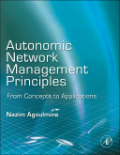
Autonomic network management principles: from concepts to applications
Agoulmine, Nazim
Autonomic networking aims to solve the mounting problems created by increasingly complex networks, by enabling devices to decide, without human intervention, what to do at any given moment, and ultimately to create self-managing networks that can interface with each other, self-adapting their behavior to provide the best service to the end user in all situations.The book is intended forR&D engineers in industry and academia, who need to investigate new solutionsfor managing ever more complex systems including networks and services. It will help them to develop new solutions for managing their networks, and reduce their business costs. Companies such as Ericsson, Telefonica and Alcatel Lucent are increasingly using autonomics to solve their network problems. The book is also suitable for postgraduate students who are interested in developing their knowledge of the concepts and applications of autonomic network management, which will be the basis of future communication systems.This book provides asolid review of concepts, principles and architectures, together with an assessment of lessons learned from the ongoing initiatives in the field. It includes contributions from industry groups at Orange Labs, Motorola, Ericsson, the ANA EU Project and universities. These groups all provide chapters examining the international research projects to which they are contributing, such as theEU Autonomic Network Architecture Project and Ambient Networks EU Project, reviewing current developments and demonstrating how autonomic management principles are used to define new architectures, models, protocols, and mechanisms for future network equipment. The book includes real-world case studies which give guidance on applying autonomic network theory to a variety of network management scenarios, and provide extensive examples of how future robust networkscan be built and managed. These use cases show how autonomic solutions are used to solve real network problems, which will help readers to understand the application of these techniques, their advantages and limitations. Provides reviews of cutting-edge approaches to the management of complex telecommunications, sensors, etc. networks based on new autonomic approaches. This enables engineers to use new autonomic techniques to solve complex distributed problems that are not possible or easy to solve with existing techniques.Discussion of FOCALE, a semantically rich network architecture for coordinating the behavior of heterogeneous and distributed computing resources. This provides vital information, since the data model holds much of the power in an autonomic system, giving the theory behind the practice, which will enable engineers to create their own solutions to network management problems.Real case studies from the groups in industry and academia who work with this technology. These allow engineers to see how autonomic networking is implemented in a variety of scenarios,giving them a solid grounding in applications and helping them generate theirown solutions to real-world problems.
- ISBN: 978-0-12-382190-4
- Editorial: Academic Press
- Encuadernacion: Cartoné
- Páginas: 306
- Fecha Publicación: 13/12/2010
- Nº Volúmenes: 1
- Idioma: Inglés
